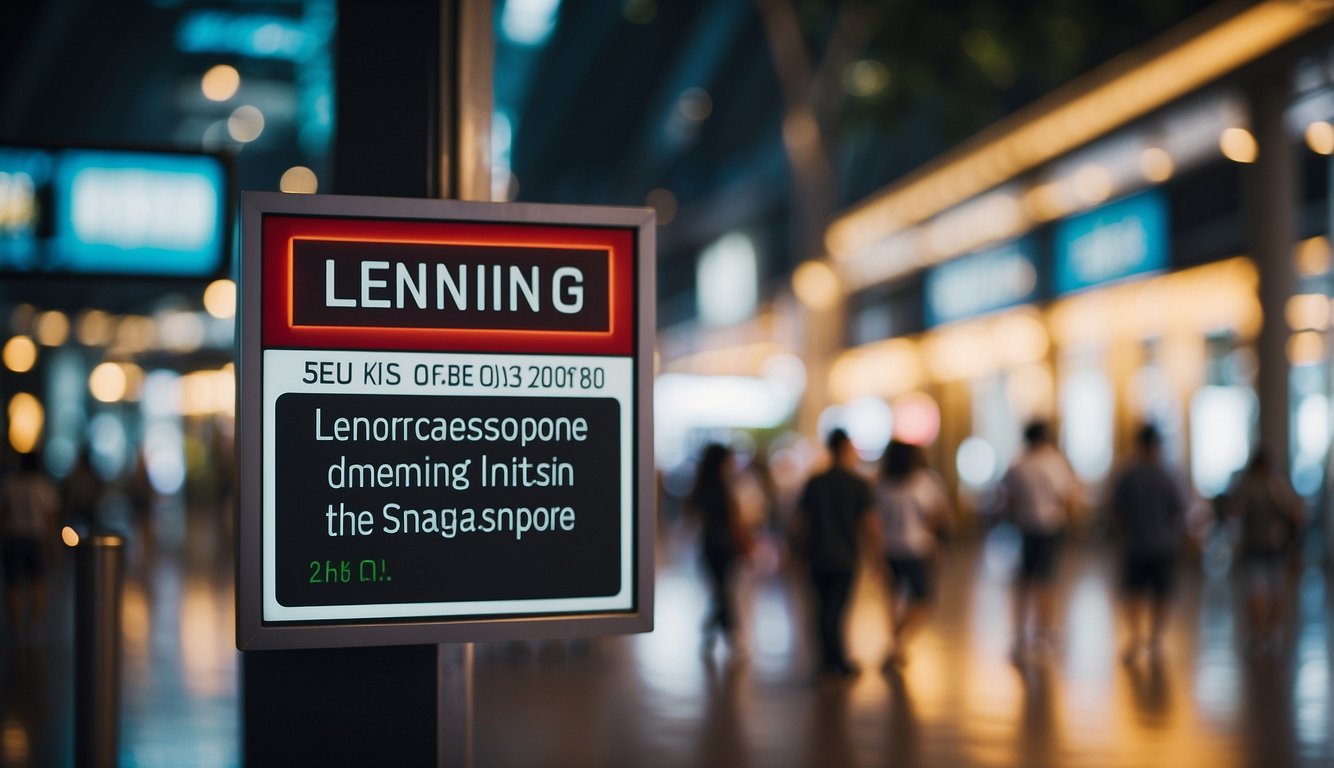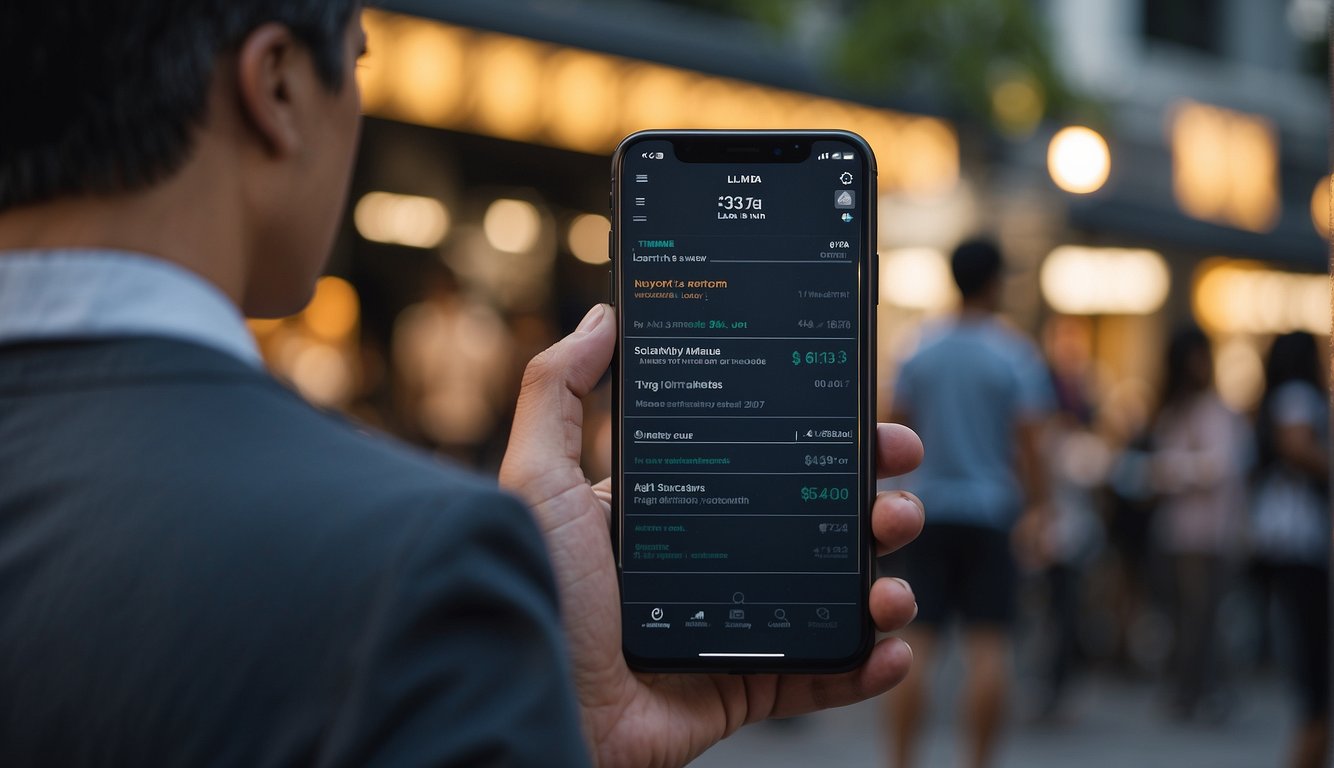Are you looking to borrow money in Singapore? If so, it’s important to understand the lending limits set by the Moneylenders Credit Bureau (MLCB). This regulatory framework was established to protect borrowers and ensure they don’t take on more debt than they can handle.

The MLCB is responsible for maintaining a database of borrower information, which licensed moneylenders are required to consult before approving loans. This information includes details on a borrower’s outstanding loans, credit score, and other financial obligations. By consulting this database, moneylenders can determine whether a borrower is eligible for a loan and what the appropriate lending limit should be.
Key Takeaways
- The Moneylenders Credit Bureau (MLCB) is a regulatory framework established to protect borrowers and ensure they don’t take on more debt than they can handle.
- Licensed moneylenders are required to consult the MLCB database before approving loans to determine a borrower’s eligibility and appropriate lending limit.
- The lending limit depends on a borrower’s income and other financial obligations, and is set by the MLCB to protect borrowers from over-borrowing.
Understanding MLCB

If you are planning to take out a loan from a licensed moneylender in Singapore, you may have heard of the Moneylenders Credit Bureau (MLCB). MLCB is a central repository of data on borrowers’ loans and repayment records with licensed moneylenders. It helps lenders make more informed decisions when considering loan applications by prospective borrowers.
Purpose and Function of MLCB
The main purpose of MLCB is to help licensed moneylenders assess the creditworthiness of borrowers. By checking the MLCB report, moneylenders can see the borrower’s loan history, including the amount borrowed, the repayment period, and whether the borrower has defaulted on any loans. This information can help moneylenders determine whether the borrower is capable of repaying the loan.
The MLCB report is in real-time, which means that any loan taken even a minute ago will be reported in your MLCB. This is unlike Credit Bureau Singapore (CBS), which might take time to update. The report also includes your credit score, which is a numerical representation of your creditworthiness.
MLCB: History and Evolution
MLCB was launched in 2016 by the Ministry of Law in Singapore. It was created to support prudence in borrowing and lending and to help prevent borrowers from borrowing beyond their means. MLCB has since evolved to become an essential tool for licensed moneylenders in Singapore.
In conclusion, MLCB is an important tool for both licensed moneylenders and borrowers in Singapore. It helps moneylenders make informed decisions when considering loan applications, and it helps borrowers understand their creditworthiness. If you are planning to take out a loan from a licensed moneylender in Singapore, it is essential to understand how MLCB works and how it can affect your loan application.
MLCB: Regulatory Framework

If you are looking to borrow money from a licensed moneylender in Singapore, it is important to understand the regulatory framework that governs moneylending in the country. The regulatory framework aims to protect borrowers from falling into debt traps and ensure that licensed moneylenders operate in a fair and transparent manner.
Moneylenders Act and Amendments
The Moneylenders Act is the primary legislation governing moneylending in Singapore. The Act sets out the rules and regulations that licensed moneylenders must comply with when lending money to borrowers. In 2018, the Moneylenders (Amendment) Act and Rules were introduced to strengthen the regulatory framework and enhance borrower protection.
Under the Moneylenders (Amendment) Act, the maximum amount that a licensed moneylender can lend to a borrower is capped at six times the borrower’s monthly income. In addition, the interest rate that a licensed moneylender can charge is capped at 4% per month. Licensed moneylenders are also required to obtain a borrower’s credit report from the Moneylenders Credit Bureau (MLCB) before granting a loan.
Registry of Moneylenders
The Registry of Moneylenders is a public register maintained by the Ministry of Law that lists all licensed moneylenders in Singapore. The registry provides borrowers with a way to check if a moneylender is licensed and therefore authorized to lend money. The registry also provides information on the license status and business address of each licensed moneylender.
In conclusion, the regulatory framework for moneylending in Singapore aims to protect borrowers from falling into debt traps and ensure that licensed moneylenders operate in a fair and transparent manner. To ensure that you are dealing with a licensed moneylender, you can check the Registry of Moneylenders maintained by the Ministry of Law.
MLCB: Borrower Information

If you are planning to borrow money from a licensed moneylender in Singapore, it is essential to understand the importance of your credit report and repayment history. The Moneylenders Credit Bureau (MLCB) is a central repository of data on borrowers’ loans and repayment records with licensed moneylenders. It allows licensed moneylenders to assess the creditworthiness of borrowers, and help to prevent borrowers from borrowing beyond their means.
Credit Reports and Ratings
The credit report is a document that contains your credit history, including your personal information, credit accounts, and payment history. It also includes your credit score, which is a numerical representation of your creditworthiness. The credit score is calculated based on your credit history, payment history, and other factors such as your income, employment status, and age.
Loan Information Report
The MLCB loan information report includes a borrower’s personal information such as name, address, birthday, NRIC number, or Unique Entity Number (for companies). The report also includes the individual’s employment data such as the employer, employer address, monthly income, and CPF contributions. If you have previously borrowed from licensed moneylenders, your loan information report will also include details of your previous loans, including the loan amount, loan tenure, interest rate, and repayment history.
Repayment History
The repayment history is a record of your loan repayment performance. It includes the date of your loan repayment, the amount paid, and whether the payment was made on time or late. Your repayment history is an important factor in determining your creditworthiness, as it shows how responsible you are in repaying your debts. If you have a good repayment history, it will be easier for you to get a loan from licensed moneylenders in Singapore.
In conclusion, it is important to understand the significance of your credit report, loan information report, and repayment history when borrowing from licensed moneylenders in Singapore. By maintaining a good repayment history, you can improve your creditworthiness and increase your chances of getting a loan at a lower interest rate.
MLCB: Lending Limits in Singapore

Are you planning to borrow money from a licensed moneylender in Singapore? It’s important to know the lending limits to avoid getting into debt trouble. In this section, we’ll discuss the two types of lending limits in Singapore: Aggregate Loan Cap and Income-Based Limits.
Aggregate Loan Cap
The aggregate loan cap is the maximum amount of money you can borrow from all licensed moneylenders combined. This cap was introduced by the Ministry of Law to protect borrowers from over-borrowing and falling into a debt trap. As of 2024, the aggregate loan cap for Singapore citizens and permanent residents is six times their monthly income, and foreigners residing in Singapore can borrow up to two times their monthly income [1].
Income-Based Limits
In addition to the aggregate loan cap, there are also income-based limits that determine how much you can borrow from a single licensed moneylender. These limits are based on your annual income and are designed to ensure that you do not borrow more than you can afford to repay. The borrowing limit is also adjusted based on whether you are a Singapore citizen, permanent resident, or foreigner.
For example, if you are a Singapore citizen or permanent resident earning less than $20,000 a year, you can only borrow up to $3,000 from a licensed moneylender. However, if you earn more than $20,000 a year, you can borrow up to six times your monthly income [2]. Foreigners residing in Singapore have a lower borrowing limit of up to two times their monthly income, regardless of their annual income [1].
It’s important to note that licensed moneylenders are required by law to assess your creditworthiness and ability to repay before approving your loan application. They must also provide you with a copy of the loan contract and explain the terms and conditions to you in a language you understand.
In conclusion, borrowing from licensed moneylenders in Singapore is regulated by strict lending limits to protect borrowers from over-borrowing and falling into a debt trap. By understanding the aggregate loan cap and income-based limits, you can make informed borrowing decisions and avoid getting into financial trouble.
[1] New Moneylending Regulations to Better Protect Borrowers to Come Into Force on 1 January 2019. Ministry of Law. Retrieved from https://www.mlaw.gov.sg/news/press-releases/new-moneylending-regulations-for-protection-of-borrowers/
[2] Guide to Borrowing from Licensed Moneylenders. Ministry of Law. Retrieved from https://rom.mlaw.gov.sg/information-for-borrowers/guide-to-borrowing-from-licensed-moneylenders-english/
MLCB: Protection and Security

Confidentiality and Integrity
When it comes to borrowing money, confidentiality and integrity are of the utmost importance. You want to make sure that your personal data is protected and that your information is kept confidential. The Moneylenders Credit Bureau (MLCB) in Singapore takes this very seriously. They have put in place strict regulations to ensure that your data is secure and that your privacy is protected.
The MLCB requires all licensed moneylenders to comply with the Personal Data Protection Act (PDPA) and the Moneylenders Act. This means that they must keep your personal information confidential and secure at all times. They are not allowed to disclose your information to anyone without your consent.
Protection for Borrowers
The MLCB also works to protect borrowers in Singapore. They have put in place regulations that limit the amount of money that can be borrowed from licensed moneylenders. The borrowing limit depends on your annual income. If your annual income is below S$20,000, you can borrow up to S$3,000. If your annual income is S$20,000 or more, you can borrow up to six times your monthly income.
The MLCB also requires licensed moneylenders to check a borrower’s loan information report from the MLCB before approving a loan. This helps to ensure that borrowers are not overextending themselves and getting into debt that they cannot afford to repay.
Overall, the MLCB is committed to protecting borrowers in Singapore by ensuring that their personal data is kept confidential and secure, and by putting in place regulations that limit the amount of money that can be borrowed from licensed moneylenders. This provides peace of mind for borrowers and helps to prevent them from getting into debt that they cannot afford to repay.
MLCB: Financial Institutions and Products

If you are in need of financial assistance in Singapore, there are several options available to you. The two main categories of financial institutions that offer loans are licensed moneylenders and banks. Each has its own set of advantages and disadvantages, depending on your needs and financial situation.
Licensed Moneylenders and Loans
Licensed moneylenders are regulated by the Ministry of Law and are required to follow strict guidelines when issuing loans. They offer both unsecured and secured loans, with interest rates capped at 4% per month. The maximum loan amount that a licensed moneylender can offer is based on your income and other factors, but it cannot exceed $3,000 for those earning less than $20,000 per year, and $6,000 for those earning more than $20,000 per year.
While licensed moneylenders can be a good option if you need a small amount of money quickly, they are generally not recommended for long-term loans or large sums of money. It is important to carefully read and understand the terms and conditions of any loan agreement before signing, as there may be hidden fees or clauses that could end up costing you more in the long run.
Banks and Alternative Options
Banks are another option for obtaining loans in Singapore. They offer a wide range of financial products, including personal loans, credit cards, and lines of credit. Banks generally require collateral or a good credit score to approve loans, and interest rates can vary depending on the type of loan and your creditworthiness.
If you do not qualify for a loan from a licensed moneylender or a bank, there are other alternative options available. For example, you may be able to obtain a loan from a credit union, peer-to-peer lending platform, or online lender. These options may have different requirements and interest rates, so it is important to do your research and compare all of your options before making a decision.
Overall, when considering a loan in Singapore, it is important to carefully evaluate your financial situation and needs, and to choose a reputable lender that offers fair terms and conditions.
MLCB: Responsible Borrowing

When borrowing from licensed moneylenders in Singapore, it is important to borrow responsibly. This means only borrowing what you need and what you can afford to repay. The Moneylenders Credit Bureau (MLCB) allows licensed moneylenders to assess the creditworthiness of borrowers and prevent them from borrowing beyond their means.
Understanding Interest and Fees
Before borrowing, it is important to understand the interest rates and fees associated with the loan. Licensed moneylenders in Singapore are allowed to charge an interest rate of up to 4% per month, and a late payment fee of up to $60 per month. It is important to note that these rates and fees can add up quickly, so it is important to borrow only what you need and can afford to repay.
Managing Financial Difficulties
If you find yourself in financial difficulties and unable to repay your loan, it is important to seek help as soon as possible. Licensed moneylenders in Singapore are required to provide information on debt assistance schemes, which can help you manage your debt and repay your loan. These schemes can include debt consolidation plans, debt management programmes, and financial counselling.
Remember, borrowing from licensed moneylenders in Singapore can be a useful tool in managing your finances, but it is important to borrow responsibly and only what you can afford to repay. By understanding the interest rates and fees associated with the loan, and seeking help if you find yourself in financial difficulties, you can manage your debt and achieve financial stability.
Enhancements to MLCB

The Moneylenders Credit Bureau (MLCB) has undergone several enhancements to better protect borrowers and promote responsible lending practices in Singapore. In this section, we will discuss two of these enhancements: the Self-Exclusion Framework and Debt Consolidation and Assistance.
Self-Exclusion Framework
The Self-Exclusion Framework is a new initiative that allows borrowers to voluntarily exclude themselves from borrowing from licensed moneylenders for a specified period. This initiative is designed to help borrowers who are struggling with debt and need to take a break from borrowing to get back on track.
Under the Self-Exclusion Framework, borrowers can apply to exclude themselves from borrowing for a period of between six months and two years. Once the exclusion period has ended, borrowers can choose to extend the exclusion period or resume borrowing from licensed moneylenders.
To apply for the Self-Exclusion Framework, borrowers can visit the MLCB website or contact the MLCB hotline. Once the application is approved, the borrower’s name will be added to the Self-Exclusion List, which is shared with all licensed moneylenders in Singapore. This means that licensed moneylenders will not be able to lend to the borrower during the exclusion period.
Debt Consolidation and Assistance
Debt Consolidation and Assistance is another initiative aimed at helping borrowers who are struggling with debt. This initiative allows borrowers to consolidate their outstanding loans with licensed moneylenders into a single loan with a lower interest rate and longer repayment period.
Under this initiative, borrowers can apply for a Debt Consolidation Plan (DCP) with a licensed moneylender. The licensed moneylender will review the borrower’s financial situation and work out a repayment plan that is affordable and sustainable for the borrower.
Once the DCP is approved, the licensed moneylender will pay off the borrower’s outstanding loans with other licensed moneylenders. The borrower will then make a single monthly repayment to the licensed moneylender, which will be lower than the total amount of the previous loan repayments combined.
In conclusion, the Self-Exclusion Framework and Debt Consolidation and Assistance initiatives are two enhancements to the MLCB that aim to promote responsible lending practices and protect borrowers in Singapore. These initiatives provide borrowers with options to manage their debt and take control of their financial situation.
MLCB: Additional Resources

Press Releases and Updates
Stay up-to-date with the latest news and updates on the Moneylenders Credit Bureau (MLCB) by checking out the Ministry of Law’s website. Here, you can find press releases and updates on the latest developments in the industry. You can also subscribe to their newsletter to receive updates directly in your inbox.
Contact Information
If you need to get in touch with the Moneylenders Credit Bureau (MLCB), you can contact them through the following channels:
- Email: You can email them at [email protected] for any queries or feedback.
- Address: The MLCB is located at 2 Shenton Way, #20-02 SGX Centre 1, Singapore 068804. You can visit their office during their operating hours if you need to speak to someone in person.
- Identify: When contacting the MLCB, make sure to identify yourself and provide your contact information so they can get back to you as soon as possible.
- Communicate: Clearly state your query or feedback in your email or when speaking to a representative. This will help them understand your issue and provide you with the appropriate assistance.
By using these resources, you can stay informed and get the help you need when it comes to the Moneylenders Credit Bureau (MLCB).
MLCB: Industry Impact

Effects on Moneylending Industry
The Moneylenders Credit Bureau (MLCB) has had a significant impact on the moneylending industry in Singapore. Under the Moneylenders Act, licensed moneylenders are required to report all loans granted to borrowers to the MLCB. This has led to greater transparency in the industry, as lenders are now able to assess a borrower’s creditworthiness more accurately.
One of the main effects of the MLCB has been the introduction of stricter loan caps for licensed moneylenders. From November 30, 2024, borrowers will be limited to borrowing a maximum of 6 times their monthly income from all licensed moneylenders combined. This has been put in place to prevent borrowers from becoming trapped in a cycle of debt.
Benefits to Consumers
The introduction of the MLCB has also had several benefits for consumers. Prior to the MLCB, borrowers may have been unaware of the full extent of their debt obligations, as they may have had loans with multiple moneylenders. The MLCB now provides borrowers with a comprehensive view of their outstanding loans, allowing them to better manage their finances.
In addition, the MLCB has also led to a reduction in interest rates charged by licensed moneylenders. With greater transparency in the industry, licensed moneylenders are now more competitive, which has led to a reduction in interest rates. This has been a positive development for borrowers, who are now able to access credit at more affordable rates.
Overall, the MLCB has had a positive impact on the moneylending industry in Singapore. It has led to greater transparency and accountability, which has benefited both borrowers and lenders. With the introduction of stricter loan caps and greater competition in the industry, borrowers can now access credit at more affordable rates, while lenders are now able to assess a borrower’s creditworthiness more accurately.
Ongoing Developments

Professionalisation of the Sector
In recent years, the government of Singapore has taken steps to professionalise the moneylending sector and ensure that it operates in a responsible and sustainable manner. One of the key initiatives in this regard has been the introduction of new rules that govern the activities of licensed moneylenders. These rules aim to protect borrowers from unscrupulous practices and ensure that they are treated fairly and transparently.
Under the new rules, licensed moneylenders are required to disclose all fees and charges to borrowers upfront, and to provide a clear breakdown of the total cost of the loan. They are also required to adhere to strict advertising guidelines, to ensure that their promotions are not misleading or deceptive. In addition, licensed moneylenders are required to undergo regular training and professional development, to ensure that they are equipped with the knowledge and skills required to provide quality services to borrowers.
Future Regulations
Looking ahead, it is likely that the government of Singapore will continue to introduce new regulations aimed at improving the moneylending sector. One area of focus is likely to be the regulation of online moneylenders, who have become increasingly popular in recent years. These lenders operate entirely online, and are often able to offer loans at lower interest rates than traditional moneylenders. However, they are also less regulated, and there are concerns that they may engage in predatory lending practices.
To address these concerns, the government is considering the introduction of new regulations that would require online moneylenders to adhere to the same standards as traditional moneylenders. This could include requirements for transparency, fair lending practices, and professional development.
Overall, the ongoing professionalisation of the moneylending sector in Singapore is an exciting development that is likely to benefit both borrowers and lenders. By introducing new rules and regulations, and by promoting greater professionalism and transparency, the government is helping to create a more sustainable and responsible moneylending sector.
MLCB: Key Considerations

If you are considering borrowing from a licensed moneylender in Singapore, there are a few key considerations you should keep in mind. This section will cover two important topics: identifying licensed moneylenders and understanding loan types and terms.
MLCB: Identifying Licensed Moneylenders
Before you borrow from a moneylender, you should make sure that they are licensed by the Ministry of Law (MLaw). This can help protect you from unscrupulous lenders who may charge exorbitant interest rates or engage in other unfair practices. You can check whether a moneylender is licensed by visiting the Ministry of Law’s website.
MLCB: Understanding Loan Types and Terms
When you borrow from a licensed moneylender, there are two main types of loans you can choose from: secured and unsecured. Secured loans require you to put up collateral, such as property or a vehicle, to secure the loan. Unsecured loans do not require collateral, but they may come with higher interest rates.
The amount you can borrow from a licensed moneylender depends on several factors, including your income and credit history. Singapore citizens and permanent residents can borrow up to S$3,000 if their annual income is below S$20,000 or up to 6 times their monthly income if their annual income is S$20,000 or more. Foreigners with an annual income of less than S$10,000 can borrow up to S$500.
It is important to note that licensed moneylenders are required to check your credit history before approving your loan. This is done through the Moneylenders Credit Bureau (MLCB), which is a central repository of data on borrowers’ loans and repayment records with licensed moneylenders. If you have a poor repayment history, you may be excluded from borrowing from licensed moneylenders.
In summary, when considering borrowing from a licensed moneylender in Singapore, you should make sure they are licensed by the Ministry of Law, understand the loan types and terms available, and be aware of the borrowing limits and credit checks conducted by the Moneylenders Credit Bureau.
MLCB: Financial Planning

If you are considering taking a loan from a licensed moneylender in Singapore, it is important to have a solid financial plan in place. This can help you manage your finances better and prevent you from falling into debt. In this section, we will discuss some important aspects of financial planning that you should consider.
MLCB: Creditworthiness and Loan Eligibility
Before you apply for a loan, it is important to check your creditworthiness. This refers to your ability to repay the loan on time and in full. Moneylenders will assess your creditworthiness based on your credit score, repayment records, and other factors such as your income and expenses.
To improve your creditworthiness, you should maintain a good repayment record for your bills and loans. This means paying your bills and loans on time and in full. You should also avoid taking on too much debt, as this can affect your credit score and make it harder for you to get approved for a loan.
MLCB: Strategies for Repayment
Once you have taken out a loan, it is important to have a strategy for repayment. This can help you avoid late payment fees and other charges, and ensure that you can repay the loan on time and in full.
One strategy is to set up a budget and stick to it. This can help you manage your expenses and ensure that you have enough money to repay your loan. You should also consider making extra payments whenever possible, as this can help you pay off the loan faster and save on interest charges.
Another strategy is to negotiate with your moneylender if you are having difficulty repaying your loan. This can involve requesting a lower interest rate or a longer repayment period, or asking for a payment plan that suits your financial situation.
In conclusion, having a solid financial plan in place can help you manage your finances better and prevent you from falling into debt. By checking your creditworthiness, maintaining a good repayment record, and having a strategy for repayment, you can ensure that you can repay your loan on time and in full.
MLCB: Data Management

Managing data is a crucial aspect of the Moneylenders Credit Bureau (MLCB) system in Singapore. The MLCB is responsible for managing a loan management system for moneylenders and borrowers. It collects data on all borrowers’ loans and payments and makes the loan information report available for ready reference to requesting parties. Here are some of the key aspects of data management in the MLCB system.
Data Security Standards
The MLCB system is designed to comply with the highest data security standards in Singapore. The system is managed by DP Information Network Pte Ltd, a subsidiary of the Singapore Exchange (SGX). DP Information Network has implemented robust data security measures, including access controls, data encryption, and security audits, to ensure that borrower data is protected from unauthorized access and misuse.
MLCB: Borrower Data Sharing
The MLCB system allows licensed moneylenders to assess the creditworthiness of borrowers and prevent borrowers from borrowing beyond their means. Borrower data is shared with licensed moneylenders who want to run credit checks on loan applicants. However, the sharing of borrower data is subject to strict rules and regulations.
Under the MLCB system, licensed moneylenders can only access borrower data for the purpose of assessing creditworthiness and preventing overborrowing. The system does not allow licensed moneylenders to use borrower data for any other purpose, such as marketing or profiling. The sharing of borrower data is also subject to a competitive tender process to ensure that only licensed moneylenders with a legitimate need for the data can access it.
In conclusion, the MLCB system in Singapore is designed to manage borrower information securely and responsibly. The system is managed by DP Information Network, which has implemented robust data security measures to protect borrower data. The sharing of borrower data is subject to strict rules and regulations, and only licensed moneylenders with a legitimate need for the data can access it.
MLCB: Legal and Compliance
As a moneylender in Singapore, it is important to adhere to the Moneylenders Act and comply with financial regulations. Failure to do so can result in penalties or even revocation of your license. Here are some key points to keep in mind:
MLCB: Adhering to Moneylending Laws
The Moneylenders Act outlines the legal framework for moneylending in Singapore. As a licensed moneylender, you must comply with the rules and regulations set out in this act. This includes:
- Registering with the Registry of Moneylenders
- Obtaining a license from the Registrar of Moneylenders
- Following the guidelines on interest rates, fees, and charges
- Ensuring that loan agreements are fair and transparent
- Keeping proper records of all transactions
MLCB: Compliance with Financial Regulations
In addition to the Moneylenders Act, moneylenders in Singapore must also comply with financial regulations. This includes:
- Registering as a company limited by shares with the Accounting and Corporate Regulatory Authority (ACRA)
- Meeting the minimum paid-up capital requirements set by ACRA
- Preparing and submitting audited accounts annually to ACRA
By complying with these regulations, you can ensure that your business is operating legally and ethically. This will help you build a positive reputation and attract more customers.
It is important to stay up-to-date with any changes to the laws and regulations governing moneylending in Singapore. This will help you avoid any potential legal issues and ensure that your business remains compliant.
MLCB: Consumer Insights
Understanding Borrower Needs
If you are a borrower in Singapore, it is important to understand your borrowing needs before approaching a licensed moneylender. According to the Moneylenders Credit Bureau (MLCB), there is no borrowing limit for secured loans. However, for unsecured loans, Singapore citizens and permanent residents can borrow up to S$3,000 if their annual income is below S$20,000 or up to 6 times their monthly income if their annual income is S$20,000 or more.
Therefore, it is important to assess your financial situation and borrowing needs before applying for a loan. You should also consider your ability to repay the loan and the interest rates charged by the moneylender.
MLCB: Market Trends and Borrower Demographics
According to the MLCB, undesirable characters are not allowed to borrow from licensed moneylenders. These include undischarged bankrupts, individuals with current or previous moneylending disputes, and those who have been convicted of loan shark harassment.
In terms of borrower demographics, the MLCB reports that the majority of borrowers are aged between 21 and 39 years old. Additionally, the MLCB reports that the number of borrowers has been decreasing in recent years, indicating a trend towards more responsible borrowing practices.
It is important to note that borrowers are required to provide their identification number when applying for a loan from a licensed moneylender. This is to ensure that the borrower is not an undesirable character and to prevent fraudulent borrowing practices.
In summary, understanding your borrowing needs and assessing your ability to repay the loan are important considerations when approaching a licensed moneylender in Singapore. The MLCB’s regulations on undesirable characters and borrower demographics provide further insights into responsible borrowing practices.
MLCB: Technological Advancements
Singapore is known for its technological advancements and the financial sector is no exception. The Moneylenders Credit Bureau (MLCB), in partnership with DP Information Network Pte Ltd and Credit Bureau Singapore, is leading the way in credit reporting and lending technology.
MLCB: Innovations in Credit Reporting
MLCB has implemented a state-of-the-art credit reporting system that provides comprehensive credit reports on borrowers. This system allows lenders to make informed decisions when assessing creditworthiness. The credit reports include information such as credit history, outstanding loans, and payment behaviour. This system has made it easier for lenders to identify risky borrowers and has helped reduce the risk of default.
MLCB: Impact of Digitalisation on Lending
Digitalisation has had a significant impact on lending in Singapore. With the introduction of online lending platforms, borrowers can now access loans quickly and easily. This has made borrowing more accessible to those who may have previously been excluded from traditional lending channels. In addition, digitalisation has made the lending process more efficient, reducing the time it takes to process loan applications.
The use of technology has also made it easier for lenders to monitor borrowers and identify potential risks. Lenders can now track a borrower’s payment behaviour in real-time, allowing them to take action quickly if there are any issues.
Overall, the technological advancements in credit reporting and lending have made borrowing more accessible and efficient in Singapore. With MLCB leading the way, borrowers and lenders alike can benefit from the latest innovations in the financial sector.
MLCB: Global Perspectives
MLCB: Comparative Analysis with Other Countries
When it comes to borrowing money, different countries have different regulations and limits. In Singapore, licensed moneylenders can lend up to $3,000 for unsecured loans to Singapore citizens and Permanent Residents, and up to 6 times their monthly income if their annual income is $20,000 or more. This limit is in place to ensure that borrowers are not overburdened with debt.
In comparison, some countries have much stricter limits. For example, in the United States, the maximum amount that can be borrowed from payday lenders is $1,000, and the interest rates are capped at 36%. In the United Kingdom, the maximum amount that can be borrowed from payday lenders is £1,000, and the interest rates are capped at 0.8% per day.
MLCB: International Credit Systems
Credit bureaus are present in many countries around the world, and they play a crucial role in the lending industry. In Singapore, the Moneylenders Credit Bureau (MLCB) is responsible for providing credit reports to licensed moneylenders. This helps to ensure that moneylenders are able to make informed decisions when it comes to lending money.
In other countries, credit bureaus have different roles and responsibilities. In the United States, for example, there are three major credit bureaus – Equifax, Experian, and TransUnion – that are responsible for collecting and maintaining credit information on individuals and businesses. This information is used by lenders to determine whether or not to approve a loan application.
Overall, credit bureaus and lending regulations vary greatly from country to country. It is important to understand the regulations in your own country in order to make informed decisions when it comes to borrowing money.
MLCB: Future Projections
As the Moneylenders Credit Bureau (MLCB) continues to collect and maintain records of borrowers’ loans and repayment histories, the future of the moneylending sector in Singapore looks promising. Here are some exciting predictions for the future of the industry:
MLCB: Predictions for the Moneylending Sector
With the MLCB providing a centralised database of borrowers’ credit histories, licensed moneylenders will be able to make more informed decisions when assessing loan applications. This will lead to a more efficient and streamlined lending process, which will benefit both lenders and borrowers.
Furthermore, the MLCB will help to prevent borrowers from borrowing beyond their means, which will reduce the risk of default and increase the overall stability of the sector. This will lead to more competitive interest rates and better loan terms for borrowers.
MLCB: Evolving Credit Practices
As personal credit becomes more important in Singapore, the MLCB will play a crucial role in helping borrowers to improve their credit scores. By maintaining accurate records of borrowers’ loan histories, the MLCB will enable borrowers to demonstrate their creditworthiness to potential lenders.
In addition, the MLCB will help to enforce aggregate loan caps, which will prevent borrowers from taking on too much debt. This will help to reduce the risk of default and improve the overall financial health of borrowers.
Overall, the future of the moneylending sector in Singapore looks bright, thanks in part to the MLCB’s efforts to improve credit practices and promote responsible borrowing. As the industry continues to evolve, borrowers can look forward to more competitive rates and better loan terms, while lenders can benefit from a more efficient and stable lending process.
Frequently Asked Questions
How much can one borrow from a licensed moneylender in Singapore?
Licensed moneylenders in Singapore can offer secured and unsecured loans. There is no borrowing limit for secured loans. For unsecured loans, Singapore citizens and permanent residents can borrow up to S$3,000 if their annual income is below S$20,000, or up to 6 times their monthly income if their annual income is S$20,000 or more. You can find more information on how to read your Moneylenders Credit Bureau Report (MLCB) here and a comprehensive guide to understanding MLCB here.
What’s the cap on interest rates set by moneylenders in Singapore?
The interest rates that licensed moneylenders in Singapore can charge are regulated by the Ministry of Law. For secured loans, the maximum interest rate that can be charged is 2% per month. For unsecured loans, the maximum interest rate that can be charged is 4% per month. Late interest fees are also capped at 4% per month. You can find more information on the Moneylenders Credit Bureau (MLCB) here.
Can borrowing from a licensed moneylender impact your credit score?
Yes, borrowing from a licensed moneylender can impact your credit score. Licensed moneylenders in Singapore are required to report all loan information to the Moneylenders Credit Bureau (MLCB). This includes information on the loan amount, interest rate, repayment history, and any defaults or late payments. This information is then used to calculate your credit score. You can find more information on the implications of the Illegal Money Lending Act in Singapore here.
What are the implications of the Illegal Money Lending Act in Singapore?
The Illegal Money Lending Act (IMLA) in Singapore is a law that was enacted to combat loan shark activities. The IMLA makes it illegal for individuals or businesses to lend money without a valid license. If you are caught borrowing from an unlicensed moneylender, you could face legal action. In addition, unlicensed moneylenders are not regulated by the Ministry of Law and may charge exorbitant interest rates and fees. You can find more information on how to remove self-exclusion in Singapore here.
How does one go about removing self-exclusion in Singapore?
Self-exclusion is a process where individuals can voluntarily exclude themselves from borrowing from licensed moneylenders in Singapore. If you wish to remove self-exclusion, you can submit a request to the Moneylenders Credit Bureau (MLCB) by filling out a form and providing the necessary supporting documents. You can find more information on what a ‘Non-DCL’ loan means within the Singaporean financial context here.
What does ‘Non-DCL’ loan mean within the Singaporean financial context?
A ‘Non-DCL’ loan refers to a loan that is not reported to the Moneylenders Credit Bureau (MLCB). These loans are typically offered by banks and other financial institutions that are not licensed moneylenders. As a result, these loans do not impact your credit score and are not subject to the same interest rate caps as licensed moneylenders. However, it is important to read the terms and conditions carefully before taking out any loan.

